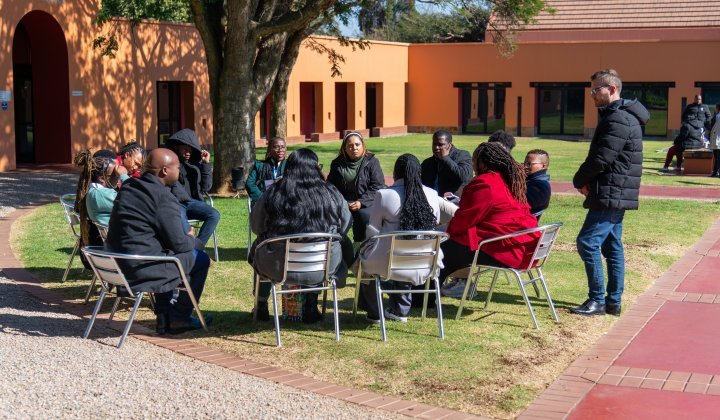In July, Mahanyele-Dabengwa marked a one-year milestone after her historic appointment as the first black female executive to drive the media company that has been transformed into a global tech organisation. The appointment was well received in the business fraternity.
Through the newly created Naspers Foundry, a notable equity capital has been set aside for her to carry out her task of scaling the group’s South African investments in local technology companies and creating an enabling environment for internet entrepreneurs.
She is on a quest to discover and invest in founder-led, tech start-ups that make a difference in the lives of South Africans and turn them into significant global players with a presence in the BRICS countries, and beyond. Executed successfully, this move could transform Naspers’ headquarters in Cape Town into an African version of Silicon Valley.
“We committed R1.4 billion to Naspers Foundry over a 3-year period, with the aim of funding and backing promising entrepreneurs with early-stage tech companies. Foundry is all about helping South African entrepreneurs build great tech businesses. We provide a unique blend of venture capital and deep operational experience, and have discovered that the entrepreneurs and founders we back find it hugely beneficial that they are able to tap into our global experience and expertise as they grow their businesses,” she explained.
Mahanyele-Dabengwa will not be operating in a vacuum as she executes her responsibilities. She will take her cue from Naspers’ historic innovation. Founded as a print media company in 1915, Naspers transformed itself into a global internet group considered to be among the world’s top 10 internet-based businesses serving over 1.5 billion people across the world. Apart from creating its own businesses from the ground up, the company also invests in early-stage companies and grows them to scale. The group’s tentacles are spread across operations in internet communication, entertainment, gaming and e-commerce. It boasts a significant presence in the BRICS countries, with one of its most successful investments being in Chinese digital media and telecom conglomerate, Tencent.
In the South African market, Naspers’ e-commerce division includes Takealot, Mr D Food, Superbalist, OLX, Autotrader, Property24 and PayU, while its media business, Media24, continues to be one of the country’s largest producers of print and digital media news platforms.
Mahanyele-Dabengwa is one of the group’s key executive appointments in recent years. Shortly before celebrating its centenary, Naspers appointed Dutch businessman, Bob van Dijk, as its Group CEO in 2014. Van Dijk also heads Prosus, the group’s strategic technology investment arm that focuses on building leading technology companies in high-growth markets and is listed in Amsterdam, with a secondary listing on the Johannesburg Stock Exchange.
SweepSouth
A true patriot and a firm believer in women empowerment, one of Mahanyele-Dabengwa’s first key investments in her new position was to provide a sizeable chunk of capital to scale SweepSouth, South Africa’s fast-growing application that connects customers with vetted cleaners in real-time.
“The first investment Foundry made was into SweepSouth, a tech business led by a black woman. I am proud of the fact that we are a significant investor in Aisha Pandor’s business which has created employment for more than 15,000 people. I have come across a number of start-up business owners who credit her with their growth. This speaks to the saying that ‘when you help a woman, you help a nation’,” she said.
When it comes to gender, she notes that “we need more of a partnership approach in which men and women play complementary roles, and one in which they learn from each other. I do believe that this ultimately leads to greater gender equality in the workplace where we work beside each other, rather than in the traditional hierarchical manner,” she explained.
Mahanyele-Dabengwa’s rise to lead the South African interests of the group, five years after Van Dijk’s appointment, is viewed as a reflection of the continuous evolution of what was once a conservative newspaper company. A highly accomplished business leader, Mahanyele-Dabengwa joined Naspers from Sigma Capital, an investment company she co-founded and steered as its executive chairperson. Prior to that, she was the CEO of the Shanduka Group, a black-owned investment holding company founded by President Cyril Ramaphosa. She joined the Shanduka Group in 2004 and left in 2015. Among her achievements within the group, she is credited for building it from the grassroots to securing major deals with multinationals such as Coca-Cola and McDonald’s. A BEE expert and strategist, she has described her tenure at Shanduka Group as an incredible experience of working with businesses that did not exist, or which were start-ups, and having to guide them to become significant players in the economy.
She has served on various boards and earned numerous accolades, including being named Business Woman of the Year by Forbes Africa in 2014. In 2008, the Wall Street Journal placed her among their 'Top 50 Women in the World to Watch’ list, and she was selected by the World Economic Forum as a Global Young Leader in 2007.
Her own woman
Her rise to the top has been attributed to her well-connected family – her late father, Mohale Mahanyele, was an entrepreneur and a proponent of black economic empowerment, while her stepmother, Sankie Mthembi-Mahanyele, is a former government minister. Also, her close relationship with her mentor, President Ramaphosa, is often alluded to as the reason behind her meteoric success as a businesswoman.
While she acknowledges the importance of their roles in her life, Mahanyele-Dabengwa deplores the inferences that she is riding on President Ramaphosa or her parents’ coattails, preferring to be recognised as her own woman.
For her position at Naspers, she has drawn from her rich experience as a venture capitalist dating back to her tenure at Fieldstone, a New York-based investment company that was her base in the 1990s, to structuring some of South Africa’s largest BEE deals upon her return to the country in the early days of democracy, followed by a role at the Development Bank of Southern Africa (DBSA) before moving to Shanduka and Sigma Capital. She described all the roles as “different experiences”, but ones in which she experienced a lot of growth, while summing up her current role as “exhilarating”.
“I find Naspers exciting and challenging in a positive way, as the business is doing interesting things in different markets worldwide. I was especially drawn to the fact that the shift from offline to online commerce was accelerating across the world, and that Naspers was part of that evolution. That, and the smart, dynamic, and interesting group of leaders who interviewed me made the job and the business even more compelling.
“I am part of the global group management committee, and as CEO South Africa, my role includes supporting the group’s day-to-day activities in South Africa, helping to shape the strategy for the group here, and engaging stakeholders at the highest levels to help realise our goals as a JSE-listed company.
“I find it hugely gratifying to lead a team that helps entrepreneurs scale and grow their businesses. This is, after all, what I have been doing for most of my career – investing in companies that show potential,” she said.
Hunting unicorns
To reach budding local entrepreneurs that are worth backing, Naspers has partnered with South African universities which incubate technology innovators while also offering these entrepreneurs education that serves as a much-needed business foundation.
In a quest to unearth tech entrepreneurs, Naspers has recognised South Africa’s historic inequalities as well as the slow penetration of the internet, especially in disadvantaged communities. To compensate for that, it created Naspers Labs, a youth development programme aimed at helping thousands of young people from an impoverished background to gain skills and confidence to access jobs or to start their own businesses in their communities. This initiative also produces a pipeline of future tech entrepreneurs from these communities.
The first labs opened in Delft and Philippi, both townships in the Western Cape. It provided remote learning solutions for more than 2,000 participants, of which – according to Mahanyele-Dabengwa – 60% of the attendees went on to secure their very first jobs. She added that plans are in motion to open two more labs – one in Khayelitsha, Cape Town, and another in Alexandra, Johannesburg.
“We have a lot of experience in technology-enabled learning and have partnered with local experts in the youth development sector with this initiative. Our management team understands the importance of transformation given our country’s history and the pervasive inequality in our country and we are fully committed to advancing our transformation efforts in South Africa. Mentoring and supporting young South Africans has always been a personal crusade of mine, so I am glad that I am able to do this work in a professional capacity too,” she explained, adding that over the years she has personally mentored hundreds of young professionals working for various corporations across the country.
While many industries have been adversely affected by the Covid-19 pandemic, and forced to go back to the drawing board to review their strategies, Mahanyele-Dabengwa said Naspers group – which donated R1.5 billion in emergency relief to the country’s government – has sufficient liquidity to navigate the changing environment and also to continue with their strategy of building great consumer internet companies.
“All our businesses have continuity plans and we are continuously assessing potential impacts and supporting our businesses as they take appropriate, market-specific action as needed. Given that we are running a global business, the challenges of Covid-19 will vary by sector and geography, but we have teams, resources and the experience required to navigate these challenges. Our priority has been the well-being of our employees and the communities in which we operate,” she said, adding that one of the concerns that keep her up at night is how the organisation can support the government to bring the majority of South Africa’s youth into an environment where they are engaged in the economy.
We provide a unique blend of venture capital and deep operational experience...
I find it hugely gratifying to lead a team that helps entrepreneurs scale and grow their businesses.
We have a lot of experience in technology-enabled learning...








